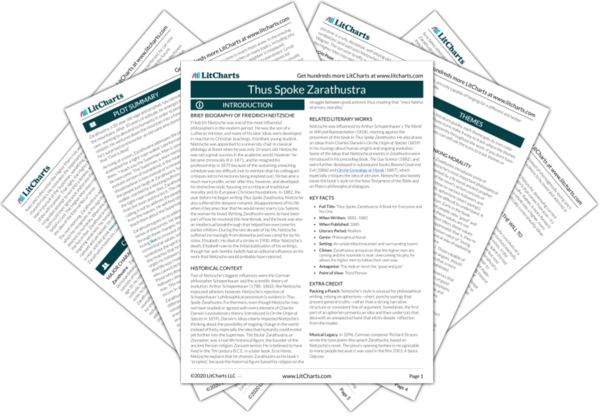Eternal Recurrence Quotes in Thus Spoke Zarathustra
'Spirit of Gravity!’ I said angrily, 'do not treat this too lightly! Or I shall leave you squatting where you are, Lamefoot—and I have carried you high!
‘Behold this moment!' I went on. 'From this gateway Moment a long, eternal lane runs back: an eternity lies behind us.
'Must not all things that can run have already run along this lane? Must not all things that can happen have already happened, been done, run past?’
Man is the cruellest animal towards himself; and […] all who call themselves "sinners" and “bearers of the Cross" and "penitents" […]
Ah, my animals, this alone have I learned, that the wickedest in man is necessary for the best in him,
that all that is most wicked in him is his best strength and the hardest stone for the highest creator; and that man must grow better and wickeder: […]
[I cried] ‘Alas, that his wickedest is so very small! Alas, that his best is so very small!’
'For your animals well know, O Zarathustra, who you are and must become: behold, you are the teacher of the eternal recurrence, that is now your destiny!
That you have to be the first to teach this doctrine—how should this great destiny not also be your greatest danger and sickness!
Behold, we know what you teach: that all things recur eternally and we ourselves with them, and that we have already existed an infinite number of times before and all things with us.
If ever my anger broke graves open, moved boundary-stones, and rolled old shattered law-tables into deep chasms:
[…]
for I love even churches and the graves of gods, if only heaven is looking, pure-eyed, through their shattered roofs; I like to sit like grass and red poppies on shattered churches:
Oh how should I not lust for eternity and for the wedding ring of rings—the Ring of Recurrence!












